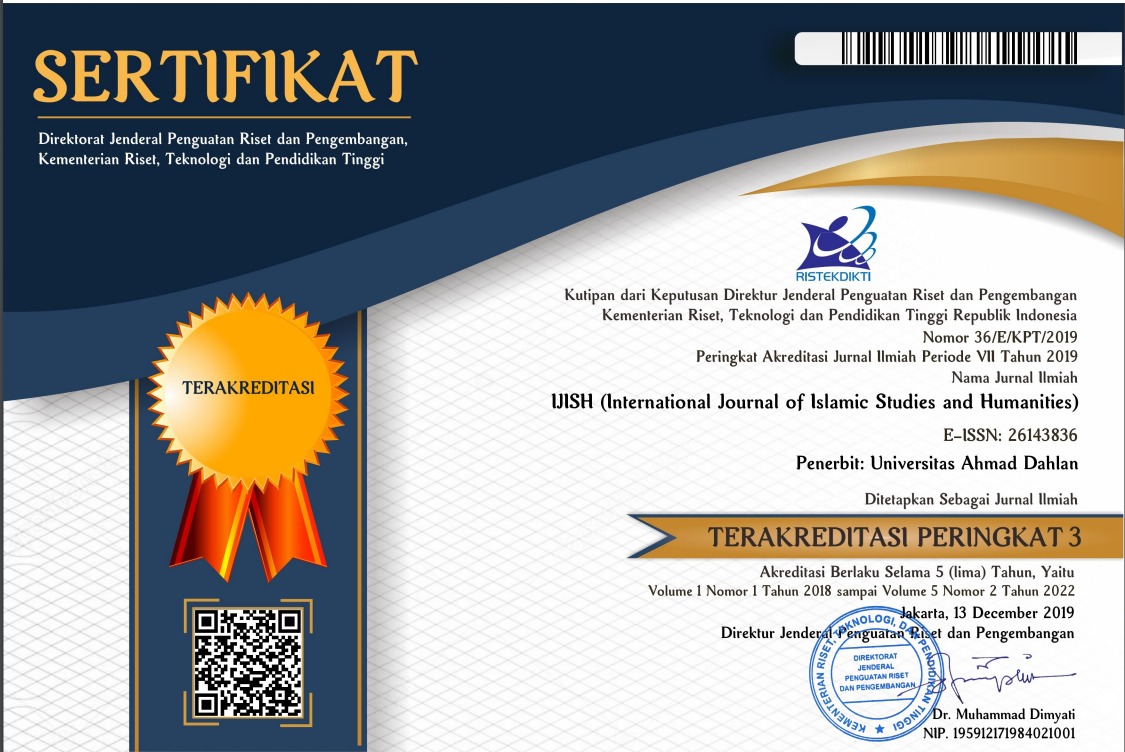Mapping the Bruneian and Acehnese reponses towards sharia law formalization and its implementation
DOI:
https://doi.org/10.26555/ijish.v7i1.8625Keywords:
Islam, Sharia law, Fiqh, Brunei Darussalam, AcehAbstract
Brunei Darussalam and Aceh are the only two Southeast Asian regions that apply Islamic Sharia law. Both regions have applied Islamic Sharia law for more than ten years and yet have received many reactions from both internal and external regarding the application. This study aims to examine the formulation of sharia in Brunei and Aceh and how the people of Brunei and Aceh respond to its implementation. Based on the findings, Shari law in Aceh hudud tends to appear more liberal and moderate because the ideas are not connected to a school of fiqh. At the same time, Brunei demonstrates a distinct "thread" with traditional fiqh ideas, particularly the Shafi'i school. This article will also discuss groups who accept Islamic law willingly, those who completely reject it, and those who are forced to accept but still criticize it.
References
Abdullah, T. (1994). History, political images and cultural encounter: The Dutch in the Indonesian archipelago. Studia Islamika, 1(3).
Abdullah, T. (1996). Agama dan Peubahan Sosial. Raja Grafindo Persada.
Afrianty, D. (2015). Women and Sharia law in Northern Indonesia: Local women’s NGOs and the reform of Islamic law in Aceh. Routledge.
Alfian, T. I. (2006). Aceh and the Holy War {Prang Sabil)-In Verandah of Violence: The Background to the Aceh Problem, edited by A. Reid. Singapore: Singapore University Press.
al-Humam, I. (2003). Syarh Fath al-Qadir ‘Ala al-Hidayah. In Beirut: Dar al-Kutub al-‘Ilmiyyah.
Ansor, M. (2019). Agensi Perempuan Kristen Di Ruang Publik. Sekolah Pascasarjana Universitas Islam Negeri Syarif Hidayatullah Jakarta.
Auni, L. (1993). The decline of the Islamic empire of Aceh (1641-1699). McGill University.
Brunei, T. redaksi P. (2014). “Allahu Akbar! Perintah Kanun Hukuman Jenayah Syari”ah 2013 Mula Berkuatkuasa.
Bustamam-Ahmad, K. (2002). Islam Historis: Dinamika Studi Islam di Indonesia. Galang Press.
Cahyani, A. I. (2015). Hukum Keluarga Islam di Brunei Darussalam. Jurnal Al-Qadau: Peradilan Dan Hukum Keluarga Islam, 2(2), 147–160.
Danial, D. (2017). Syari’at Islam dan Pluralitas Sosial (Studi tentang Minoritas Non-Muslim dalam Qanun Syari’at Islam di Aceh). Analisis: Jurnal Studi Keislaman, 12(1), 71–92.
Din, M. (2009). Stimulasi Pembangunan Hukum Pidana Nasional dari Aceh untuk Indonesia. Bandung: Unpad Press.
Feener, R. M. (2012). Social Engineering through Sharī’a: Islamic Law and State-Directed Da'wa in Contemporary Aceh. Islamic Law and Society, 19(3), 275–311. https://doi.org/10.1163/156851911X612581
Hamzah, H. (2015). Kategori Tindak Pidana Hudud dalam Pidana Islam. Al Daulah: Jurnal Hukum Pidana Dan Ketatanegaraan, 4(1), 54–77.
Haqqi, A. R. A. (2017). Islamic Law In State Life of Brunei Darussalam. Journal of Malay Islamic Studies, 1(2), 81–92.
Hassan, A. (1984). Pintu Ijtihad Sebelum Tertutup,(terj.) Agah Garnadi. Penerbit Pustaka.
Hooker, M. (1970). Introduction: Islamic Law in South-East Asia. Studia Islamika, 10(1). https://doi.org/10.15408/sdi.v10i1.636
Hurgronje, C. S. (1997). Aceh: rakyat dan adat istiadatnya. In INIS.
Hurgronje, C. S. C. (1906). The Acehnese. E.J. Brill.
Ichwan, M. N., Salim, A., & Srimulyani, E. (2020). Islam and Dormant Citizenship: Soft Religious Ethno-Nationalism and Minorities in Aceh, Indonesia. Islam and Christian–Muslim Relations, 31(2), 215–240. https://doi.org/10.1080/09596410.2020.1780407
Ikromatoun, S. (2017). Respon Masyarakat Aceh Terhadap Aturan Dan Implementasi Syariat Islam Pasca Tsunami. Jurnal Sosiologi Reflektif, 11(1), 1. https://doi.org/10.14421/jsr.v11i1.1261
Minhaji, A. (1997). Ahmad Hassan and Islamic Legal Reform in Indonesia (1887-1958). McGill University.
Minhaji, A. (1999). A Problem of Methodological Approaches to Islamic Law Studies. Al-Jami’ah: Journal of Islamic Studies, 37(63).
Muthohhar, A. H. (2003). Pengaruh mazhab Syafi’i di Asia Tenggara: fiqih dalam peraturan perundang-undangan tentang perkawinan di Indonesia, Brunei, dan Malaysia. Aneka Ilmu.
Nyazee, I. A. K., & Nyazee, M. I. A. K. (2019). Lex Islamica Series Book 2 The Original Meaning of anaf Ul al-Fiqh. Lulu. com.
Rabo, A. (2012). “We are Christians and we are equal citizens”: perspectives on particularity and pluralism in contemporary Syria. Islam and Christian–Muslim Relations, 23(1), 79–93. https://doi.org/10.1080/09596410.2011.634598
Redaksi, T. (2014). Hari Pertama Brunei Terapkan Hukum Syariah. BBC. http://www.bbc.com/indonesia/dunia/2014/05/140501_brunei_implementasi_syariah.html
Ricklefs, M. C. (2008). A History of Modern Indonesia since c .1200. Bloomsbury Publishing Plc. https://doi.org/10.5040/9781350394582
Shaw, R. (2008). Aceh’s struggle for independence: Considering the role of Islam in a separatist. In The Fletcher School Online Journal on Southwest Asia and Islamic Civilization.
Van Vollenhoven, C., Holleman, J. F., & Sonius, H. W. J. (2013). Van Vollenhoven on Indonesian adat law. Springer.
Downloads
Published
How to Cite
Issue
Section
License
Copyright (c) 2024 Abdu Muizz Mohd Salleh, Mohammad Syifa Amin Widigdo

This work is licensed under a Creative Commons Attribution-ShareAlike 4.0 International License.
Authors who publish with IJISH (International Journal of Islamic Studies and Humanities) agree to the following terms:
- Authors retain copyright and grant the journal right of first publication with the work simultaneously licensed under a Creative Commons Attribution License (CC BY-SA 4.0) that allows others to share the work with an acknowledgment of the work's authorship and initial publication in this journal.Â
- Authors are able to enter into separate, additional contractual arrangements for the non-exclusive distribution of the journal's published version of the work (e.g., post it to an institutional repository or publish it in a book), with an acknowledgment of its initial publication in this journal.
- Authors are permitted and encouraged to post their work online (e.g., in institutional repositories or on their website) prior to and during the submission process, as it can lead to productive exchanges, as well as earlier and greater citation of published work.

This work is licensed under a Creative Commons Attribution-ShareAlike 4.0 International License.






